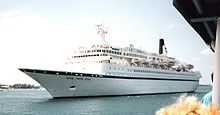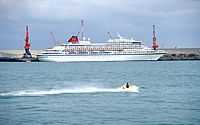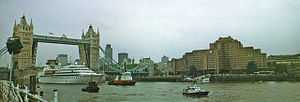Royal Viking Line
| Cruise Line | |
| Industry | Travel & Tourism |
| Fate | Merged into Cunard |
| Successor | Norwegian Caribbean Line |
| Founded | 1972 |
| Defunct | 1998 |
| Headquarters |
One Embarcadero Center San Francisco, CA, USA |
Key people | Warren Titus |
| Products | Cruises |
| Parent | Kloster (from 1986) |
The Royal Viking Line was an upmarket cruise line that operated from 1972 until 1998. The company was the brain child of Warren Titus[1] and had its headquarters at One Embarcadero Center in San Francisco.
History
Each of the line's initial three vessels was owned by one of its initial investing partners. The first, the Royal Viking Star, was completed in July, 1972. Its owner was Bergenske Dampskibsselskab (Bergen Line). The second, the Royal Viking Sky, was owned by Nordenfjeldske Dampskibsselskab of Trondheim. She was completed in July 1973. The third ship, the Royal Viking Sea, was ready in December of the same year. Her owner was A. F. Klaveness & Co, Oslo.[2]
Warren S. Titus became the first president of Royal Viking Line, which established its US head office in San Francisco.
The ships were all built by Wärtsilä Helsinki New Shipyard, Finland, and were each approximately 21,500 gross register tons (GRT) and nearly identical in appearance, with a tall superstructure and a single, scooped funnel. However, the Star was two feet shorter (581 feet), and her interior arrangement differed slightly from her two fleet-mates. Each ship featured a double-height theatre occupying an interior space on the two lowest passenger decks; however, on the Star the space just forward of the theatre on the higher of these decks was occupied by a chapel, a feature not found on either of her fleet-mates, nor any of the Scandinavian-built cruise ships of that generation. Other differences included the placement of small lounges and facilities such as the library.
These vessels were intended for longer voyages to exotic destinations, and a significant percentage of the line's passengers were wealthy retirees. As such, they featured numerous single staterooms and suites, and thus their capacity was only about 550 compared to 750-850 on similarly-sized ships of other lines. Royal Viking Line prided itself on single-seating dining, and the restaurant was situated unusually high in the ship, with large windows. Another popular feature was a glass-enclosed lounge high atop the bridge, which afforded excellent views.
On May 1, 1976 the Royal Viking Sky and Royal Viking Star became the first sister ships to have transited the Panama Canal simultaneously in different directions, the Sky sailing westbound and the Star eastbound.
Stretching
Beginning in 1980, under the leadership of then CEO Torstein Hagen, each of the three ships was "stretched" to 28,000 GRT by adding a 93-foot prefabricated midships section at the A.G. Weser shipyard in Bremerhaven. This increased each ship's capacity by 200 passengers, and mainly included the addition of cabins. Aft of the observation lounge, a new lounge and nine penthouse suites with balconies, a cruise industry first, were added. The size of the main restaurant was also doubled and now occupied nearly half of one deck in order to maintain single-seating dining.
The lengthening of the ships both improved the ships profiles and their economics. In 1984 Torstein Hagen arranged a USD 240 million management buyout of the company, with the assistance of venture capital firm J.H. Whitney & Co. After the buyout had been announced, but before it closed, the two companies owning Royal Viking decided to sell the company instead to Norwegian Caribbean Line, then part of the Kloster group. The offices were moved to Coral Gables, Florida, and Warren Titus departed in 1987. While under Kloster ownership, Royal Viking built a fourth ship, the Royal Viking Sun. Constructed by Wärtsilä in Turku, Finland, she was 39,000 GRT and carried 850 passengers. The final ship built for Royal Viking was the Royal Viking Queen completed in 1992. She was just 10,000 GRT, carrying only 212 passengers and sharing a general arrangement with the Seabourn Pride and Seabourn Spirit of Seabourn Cruise Line, the new home of Warren Titus.
In 1990, Kloster moved the Royal Viking Sea to its Royal Cruise Line brand, where she took the name Royal Odyssey, and the Star to its Norwegian Cruise Line brand, where she became the Westward.
In 1991, the Royal Viking Sky was transferred to NCL and renamed Sunward. In 1993, the "Sunward" was leased by Princess Cruises which operated her for one year as the "Golden Princess."
In 1993, the Westward ex Royal Viking Star became the Star Odyssey for Royal Cruise Line. The passenger capacity on each of the original three ships had been increased to 850, mainly with the addition of staterooms amidships on the Bridge Deck, in what used to be officers' quarters. A buffet was also added in the lounge on the top deck, since the ships did not have the casual indoor/outdoor dining area (often called a Lido) that was becoming de rigueur.
In 1994, when Kloster Cruise was in financial difficulties, the Royal Viking Line was dissolved. Royal Viking Queen was transferred to Royal Cruise Line as Queen Odyssey, while Royal Viking Sun and the Royal Viking brand were sold to Cunard Line Ltd. Cunard combined the Royal Viking Sun with four of its other ships, Sagafjord, Vistafjord, Sea Goddess I, and Sea Goddess II to form the reorganized "Cunard Royal Viking Line", which lasted until 1998. In that same year, all of Cunard Line Ltd.'s ships were merged under the Cunard Line brand, following the company's takeover by Carnival Corporation.
The Royal Viking ships today
The Royal Viking Queen operated briefly as the Queen Odyssey for Royal Cruise Line, then joined her sister ships at Seabourn Cruise Line as the Seabourn Legend, after Kloster liquidated Royal Cruise as well. Cunard Line operated the Royal Viking Sun with her original name until 1999, then she joined her former fleetmate as the Seabourn Sun, as by this time, Seabourn had been acquired by Cunard's parent, Carnival, and merged into Cunard Line Ltd. This phase lasted until 2002, when she was transferred again to Holland America Line Inc. (another Carnival subsidiary), becoming the second Prinsendam, for Holland America Line, where she remains today.
After several more changes of name and ownership, the former Royal Viking Star and Royal Viking Sky sail with Fred. Olsen Cruise Lines, the Royal Viking Star as the Black Watch and the Royal Viking Sky as the Boudicca. Aboard both ships, the lounge/buffet on the top deck has been replaced with additional passenger cabins, while the observation lounge above the bridge remains. The length of Bridge Deck is now occupied by passenger cabins (with the ship's officers scattered around the ship). Aboard the Black Watch, the aft portion of the formerly vast main dining-room has been converted to two smaller restaurants and an additional lounge. A spacious, glass-lined space on the top deck hosts the fitness center and spa. The former chapel has been carved into three additional staterooms. The changes on Boudicca are even more radical, where the dining-room space was broken up into no fewer than four separate restaurants and the space formerly occupied by the theatre has been converted into additional staterooms and a fitness centre.
The former Royal Viking Sea sails for the German company Phoenix Reisen as the Albatros. Layout-wise, she has probably changed the least, with the majority of public rooms remaining in their original configuration.
Royal Viking line ships were featured prominently in the book Voyages of the Royal Viking by the photographer and artist Harvey Lloyd.
Fleet
| Ship | Built | In service for Royal Viking Line | Tonnage | Status as of 2013 | Image |
|---|---|---|---|---|---|
| Royal Viking Star | 1971 | 1972-1991 | 21,847 GRT | Since 1996 MS Black Watch for Fred. Olsen Cruise Lines. |  |
| Royal Viking Sky | 1973 | 1973-1991 | 21,891 GRT | Since 2005 MV Boudicca for Fred. Olsen Cruise Lines. | |
| Royal Viking Sea | 1973 | 1973-1991 | 20,018 GRT | Since 2004 MS Albatros for Phoenix Reisen. |  |
| Royal Viking Sun | 1988 | 1997-1999 | 38,848 GT | Since 2002 MS Prinsendam for Holland America Line. |  |
| Royal Viking Queen | 1992 | 1992-1995 | 9,961 GT | Since 1996 MV Seabourn Legend for Seabourn Cruise Line. |  |
References
- ↑ Maxtone-Graham, John Crossing and Cruising New York: Charles Scribner's Sons, 1992.
- ↑ Dawson, Philip Cruise Ships: An Evolution in Design London: Conway Maritime Press, 2000.
External links
- Online Magazine with Royal Viking Line
- Website with stories from Royal Viking Line
- Simplon Postcards: Royal Viking Line
- Phoenix Reisen - operator of the former Royal Viking Sea
- Fred. Olsen Cruise Lines - operator of the former Royal Viking Sky and Royal Viking Star
- Holland America Line - operator of the former Royal Viking Sun
- Seabourn - operator of the former Royal Viking Queen
- Video Clips of Royal Viking Sun
- Video Clip of Royal Viking Sky
- Video Clips of Black Watch (ex. Royal Viking Star)
- photos of Black Watch (ex. Royal Viking Star)
| ||||||
| ||||||||||